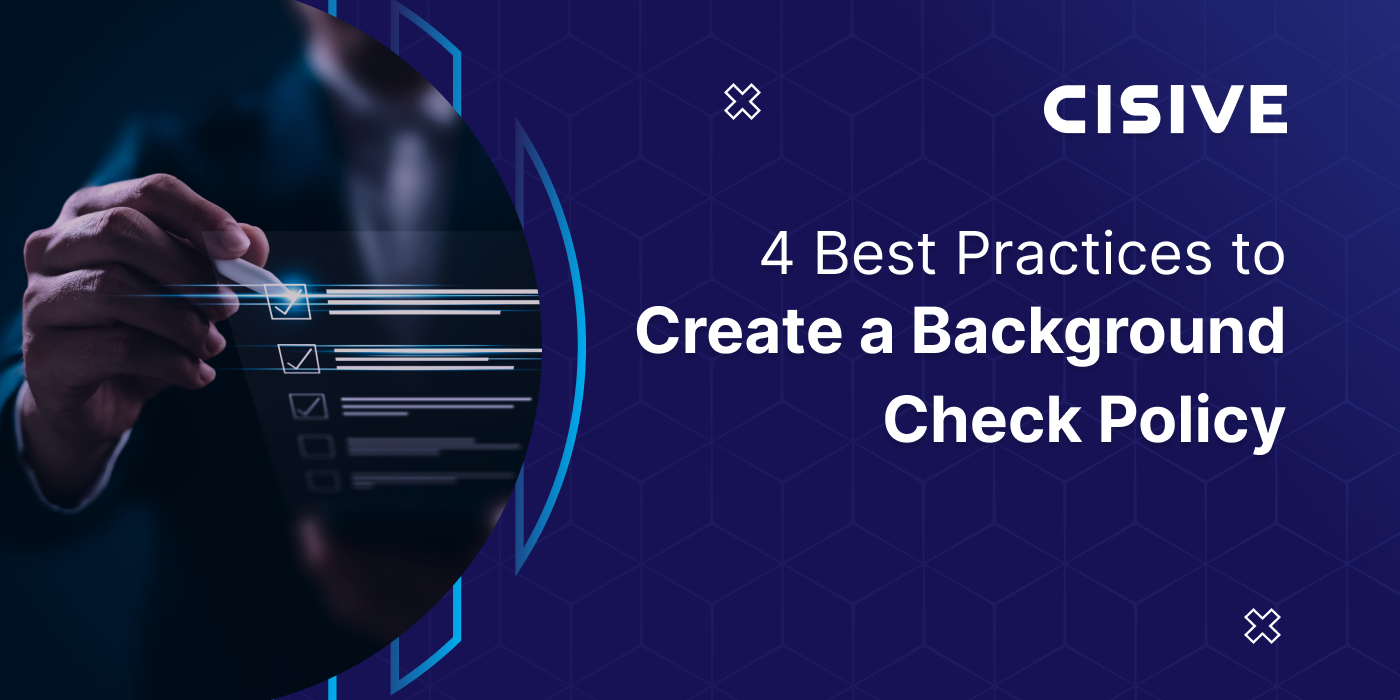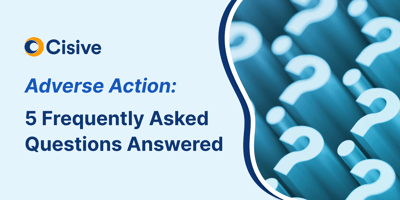

As an employer, background checks are part of your hiring process. You can screen candidates based...

As an HR or talent management pro, you know background checks are valuable in protecting your company and your customers. Not having a policy in place for how to conduct background checks can have important adverse effects on your company.
Imagine having an inefficient process that turns off good candidates. Or, worse, inadvertently treating candidates differently in ways that make your company seem biased or discriminatory.
A thoughtfully written background check policy is key to avoiding legal problems and delivering a great on-boarding experience for candidates. Based on the Cisive team’s vast experience in every aspect of background checks, we’ve put together this comprehensive guide to explain what employers should know about pre-employment screening policies.
Key TakeawaysHere are the key things you need to know about background check policies:
|
A background check policy is a document with guidelines and instructions for how your organization conducts pre-employment screenings. They are often created through cooperation between HR teams and legal counsel to make sure the final policy complies with all applicable laws and regulations in your industry, state, and country.
Background check policies should be understood by all hiring managers, HR employees, and anyone involved with background checks. The policy may also be provided to job applicants at the appropriate point in the hiring process, which helps promote transparency.
Having a pre-employment screening policy helps you conduct consistent, unbiased, and thorough background checks. Your policy can be applied to the many distinct types of individual search components that your background checks, may include like:

Having a policy in place will streamline the hiring process, help keep you compliant with the US-EEOC guidance known as the “Green Factors,” and other state and local laws, to help ensure you are hiring the right candidates. Here are the key benefits of creating a solid background pre-employment screening policy:
Background checks are regulated by a variety of federal and state laws. If violated, they can subject your organization to reputational damage, monetary fines, and other legal consequences. Having a written policy can help reduce the possibility that your hiring practices violate discrimination laws and avoid noncompliance with the Fair Credit Reporting Act, for example.
Organizations need consistency and clarity in all aspects of their operations, including hiring. Well-written background check policies enable hiring managers and HR teams to conduct screenings and interpret results the same way each time. This leads to fair outcomes and more satisfied candidates.
The depth of background checks can vary depending on the type of role for which you’re hiring. For example, you may want to do more extensive screening when the job responsibilities include working with customers’ financial or health information. You might also desire more thorough checks for executives than entry-level positions.
Your background check policy can detail the procedures and expectations for conducting screens for all types of roles. This can be especially valuable because you may not hire for certain high-level roles very often. Having a policy in place gives your HR teams a resource to reference when it is time to hire those rarer positions.
It’s not uncommon for job applicants to embellish their resumes or omit background information to make themselves look better on paper. This can make it a challenge for HR professionals to verify information and check references. It also puts the company at risk of hiring someone who is underqualified or simply the wrong fit.
A background check policy gives your team a framework for gathering and verifying information provided by candidates. This applies to both external and internal job candidates. The policy can also provide consistency and guidance for conducting future rescreening or ongoing employee checks.
An employer’s background check policy should set out to provide guidance on the following topics:
The following sections go into further detail on topics that are commonly included in a background check policy:
It is important to remember that criminal records and other information found in background checks are not intended to be punitive. Private companies and other organizations’ primary screening goals should always be focused on RISK prevention.
This introductory section of the policy explains why background checks are important for your company. Include a brief statement about how screenings help the company verify candidates’ identities, qualifications, experience, criminal histories, and general fitness for the position in question. You can also mention how they ensure that the company complies with legal requirements.
This section is where you can define which roles require background checks and how deep those checks must go. Here are examples of questions you can ask as you are drafting this section:
It’s important for background screens to be performed in a consistent manner. Your policy can help by spelling out the steps that should be taken every time.
Start from the very beginning. Note that your company’s employment procedure begins by notifying applicants that a pre-employment screening will be conducted. Take the opportunity to detail your risk-based approach, to prioritize and maintain a safe workplace.
The policy can then explain what happens after the interview process. This could include getting the candidates’ written authorization to let you conduct a screening prior to making a hiring decision. Your policy can also state what happens if a candidate refuses to give authorization for screening.
Your policy should also list a procedure for handling negative information revealed by a screen. For example, the policy could discuss any adverse action process that may exist. It can detail how your company must follow that process before officially turning down the applicant.
If you decide to do pre-employment background checks in-house, you’ll need to establish comprehensive procedures. You’ll need to ensure that your hiring team complies with all local, state, federal, and international laws (if hiring abroad). As you can imagine, this can be burdensome, and it involves a good deal of risk.
You could instead rely on a third-party screening partner like Cisive for your background checks. An experienced third party can offer technology built specifically for screening. They can also manage compliance, relieving your internal team of this large responsibility and freeing up their time to focus on other work.
These are the forms you will send to candidates. They inform candidates that you intend to conduct a screening and obtain their authorization in writing. A proper stand-alone disclosure and authorization is required by law, before screening, particularly regarding employment. This requirement has also been previously interpreted to include independent contractors, agents, volunteers, and others; applying to situations where an entity uses individuals who are NOT technically employees to perform duties.
You can include a statement that being screened is a condition of employment. Note that refusal to be screened will cause you to no longer consider the person’s application.
These forms can be integrated into the digital background check flow that comes with a third-party provider’s screening tool.
You will at some point need to deal with the results of a screen showing that a candidate has a criminal conviction in their past. The Equal Employment Opportunity Commission (EEOC) provides guidance to companies on how to handle these situations.
The EEOC says hiring organizations should assess each criminal offense individually rather than having a blanket approach to these situations. Evaluate these three main factors:
Write down the process your hiring team uses to assess the results of background checks. Explain the steps to be taken if you decide not to hire or promote someone due to the results of a screening. Allow the candidate to request an individualized assessment to review and provide additional relevant information about any records or to challenge the veracity of the records. Always follow a documented adverse action letter process as required by the FCRA and comply with any additional state/local processes that may be required.
All background screening reports are CONFIDENTIAL, regardless of content. Document how long you will retain screening results and outline a plan to properly dispose of them after that time ends. Your legal team may guide you on retention and disposal. They can also help you understand FTC guidelines on disposing of documents and digital files that contain people’s personal identifying information.
You should also specify how often you will review your company's background check process and policy. We recommend reviewing at least annually. And make sure to review and edit the policy as your organization changes or as new rules or laws go into effect in the various local jurisdictions that regulate your company.

Here are four best practices to adhere to when creating or updating your pre-employment screening policy:
Make sure the policy is written in a way that makes it applicable across the entire organization. You need the same standards and practices to always be used consistently to ensure that your background checks are fair.
Additionally, a comprehensive policy helps your hiring teams understand when and how background screens should be conducted. It takes away uncertainty and guesswork, allowing teams to hire with more confidence.
Your policy must be written to comply with all local, state, federal, and international laws (particularly when hiring abroad). Employers that hire in multiple jurisdictions need to comply with the laws in the locations in which they hire, and those laws can differ greatly. Criminal background checks might be fine in City A, but City B may restrict or even ban the use of some criminal information.
Compliance with differing rules is one of the biggest burdens of conducting pre-employment screening. It’s one of the main reasons companies decide to use a partner like Cisive for screening.
All screenings should be consistent, no matter the candidate’s race, age, sex, religion, disability, or other protected characteristic. HR background check policies encourage uniformity by providing clear directions on when and how screenings should be used. This helps your organization reduce legal and reputational risks.
Employment screening and hiring practices are always evolving. Stay in touch with HR industry news and talk to your legal department regularly to stay informed about regulatory changes. Then, update your screening policy accordingly.
Bolster your organizational effectiveness by creating a comprehensive pre-employment background check policy. It’ll help your hiring teams be more efficient while giving your job candidates a good impression of your company. To learn more about background check policies, contact the experts at Cisive.
Author: Michael Kendrick
Bio: Senior Manager of Corporate Compliance at Cisive.
Let's Connect on LinkedIn
As an employer, background checks are part of your hiring process. You can screen candidates based...

California’s Fair Chance Act is part of the Fair Employment and Housing Act (FEHA), and its primary...

Understanding how the adverse action process works is crucial to staying on the right side of the...